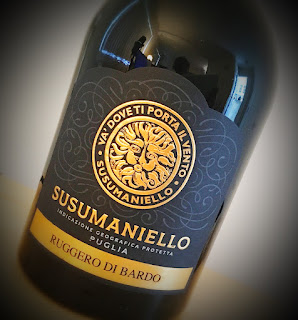Today we go back to Manduria, in Puglia, the heel of Italy's boot. The Gambero Rosso virtual tasting event has already covered a number of Primitivo di Manduria wines, but these two are special.
Felline Primitivo di Manduria Zinfandel Sinfarosa Terra Nera 2017
Feline's Gregory Perrucci spoke during the online event about how Ridge is one of his favorite California producers of Zinfandel. He said "now it can be told" that he visited the winery and brought back a cutting from the Geyserville vineyard. He grafted it to one of his Primitivo di Manduria vines, and so he uses both the Italian and American names for the grape on the Sinfarosa label.
The Felline website refers to this particular grape as "Zinfandel Californiano," but it is properly identified on the label as Primitivo di Manduria. even the label art recalls a poster from the old American west. The label also bears the name of the production area, Terra Nera. The Felline "hybrid" was aged for six months in French and American oak. It carries a walloping 15% abv in alcohol and sells for less than $20.
This wine is medium-dark in the glass, and full-blown dark on the nose. Aromas of black fruit leap out first, but the tar notes follow quickly. It has a peppery smell to it and a healthy amount of chocolate and cigar box. The palate is full and lush. Blackberry notes, anise, mocha and bramble all join together with firm tannins and a lengthy finish. I want a steak with this one, but a sausage and pasta dish would be nice, too. You can also enjoy it by itself as it is quite sip-worthy.
Coppi Gioia del Colle Primitivo Senatore 2017The Coppi Winery started in Puglia in 1882 and has passed through several hands over the years. Antonio Coppi entered the cellar in the late 1960s, producing wines grown in the stony soil of the hills of the "Murgia dei Trulli." The winery proudly declares that they are "in the cradle of the Primitivo DOC Gioia del Colle." Coppi would go on to become a senator, with the Senatore wine named in honor of that achievement. His daughters and son are involved in the business today.
The Coppi family still carries a chip on their shoulder about how Apulian wines have been "mistreated and snubbed" by the mainstream Italian wine industry. It is the company's aim to restore "dignity and prestige" to the region through their wines. In addition to Primitivo, the Coppi vineyards also hold grape varieties like Aleatico, Verdeca, Malvasia, Negroamaro, and Falanghina.
The 2017 Senatore was fermented in steel tanks, then aged for a year in Slavonian oak barrels. Alcohol is restrained at 13.5% abv and the wine typically sells for around $25.
The wine is quite dark in the glass but is also very closed off on the nose. There is some black plum and some tar, but it is surprisingly faint. The palate isn't shy about showing its dark fruit with a layer of savory spice and anise over it. The tannins are not forceful, so pairing with pasta is a cinch, or just sip it. It is very tasty and smooth, and has a lengthy finish.
Follow Randy Fuller on Twitter











